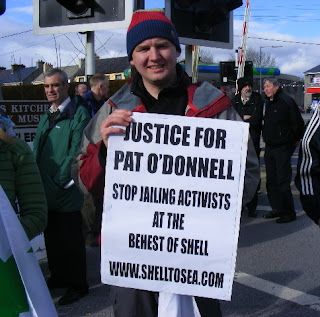Play In Dore A Success
18/03/2011
Almost 100 people gathered on Sunday February 19th in Dore Community Centre to see the play 'Far Off Fields'. The play, written by Jonathan Burgess and directed by Kieran Quinn, dealt with the issue of hiring fairs in 19th century rural Ireland and the trials and tribulations experienced by those who where hired out at these fairs.
 |
| Strabane hiring fair |
The story of the play staged by the Balour Arts Theatre concerned two main characters, teenagers Niamh and Jack. Both characters were hired out at a fair to work on farms and the play told of the dire reality that faced a lot of children in those times. The young girl Niamh faced particularly harsh treatment from the farmer she worked for and the story goes on to tell of how Jack secures better work elsewhere and comes back to rescue her.
The evening, supported by the Peace III Programme and Donegal County Council, began with a talk led by Professor Liam Kennedy of the School of History and Anthropology at Queens University Belfast, and equality and diversity consultant Fiona Mc Gaughey. During the talk, Professor Kennedy gave an interesting and in-depth look at what life would have been like in 19th century Ireland and how the hiring fairs of the time would have worked, as well as a description of the experiences of those hired out at those fairs.
This was followed by a talk by Fiona Mc Gaughey which looked at the subject of human trafficking. Saying that while human trafficking was perhaps not a modern day equivalent of the hiring fairs, Ms Mc Gaughey said it was certainly an issue occurring in Ireland today with some parallels to the child labour of the hiring fairs which Professor Kennedy and previously mentioned. Fiona Mc Gaughey's talk then went on to discuss examples of human trafficking in Ireland today, including in County Donegal, and the work that is being done to counter-act it.
Speaking after the play, event organiser Micheál Cholm Mac Giolla Easbuig praised those who staged the play and took part in the talk. “I must congratulate everyone for their efforts tonight. This was a very interesting and informative evening” Mr Mac Giolla Easbuig said. “The play was not only a first class piece of entertainment but it was also very educational. Added together with the talks that were given before the play, it cast a whole new light on a much forgotten piece of our history.
“Given that so many families in Ireland, especially in rural Ireland like here in Donegal, experienced these hiring fairs, we must never forget the harsh lives that our ancestors had to endure. Likewise, we must also be aware that such harsh treatment continues today in the form of human trafficking and these horrors are not just something we see on television, but are actually happening in our own country and indeed in our own county. I feel it is important to educate ourselves in these matters so we can stop such things from happening and I feel tonight might have provided such an platform for that.”
Thanking those involved Mr Mac Giolla Easbuig concluded “I must thank everyone involved for making it such a successful evening. The staff of Dore Community Centre, Liam Kennedy and Fiona Mc Gaughey, Karin White of Peace III and Sarah Lapsley all helped to make it a great event. I must also thank Lisa Finn of the Balour Arts Theatre and of course the cast and crew of the play for putting on such a fantastic performance. Hopefully it won't be too long before we see them back in West Donegal again.”









